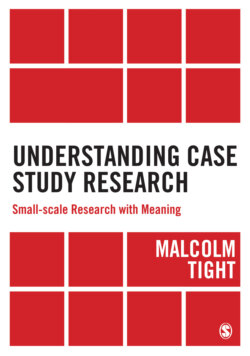Читать книгу Understanding Case Study Research - Malcolm Tight - Страница 29
На сайте Литреса книга снята с продажи.
Perceived Weaknesses of Case Study and Responses to These
ОглавлениеBox 3.2 identifies three key weaknesses of case study: generalisability, reliability and validity (or rather the perceived lack of these qualities). These weaknesses, particularly the perceived lack of generalisability, are persistent criticisms, and case study practitioners would do well to show awareness of them and respond appropriately. One appropriate response, of course, would be to emphasise the strengths of case study. Another, adopted in this section, is to explore and better understand the criticisms, and discuss how they might be addressed. We shall look first at generalisability, then at reliability and validity, and finally at some other issues that are raised less often.
These issues, as we have already indicated, have been widely and hotly debated with respect to case study. It is important to stress, therefore, that they are issues which need to be considered for all research designs. Indeed, like most such criteria, they originate from quantitative and scientific research, raising the issue of whether qualitative and social scientific forms of research can, or should, be judged in the same way. While, as I have argued, case study research may be quantitative, qualitative or both, these issues nevertheless have particular purchase because quantitative research is typically larger-scale, while case study research is expressly small-scale, so is always liable to be criticised in these ways.
